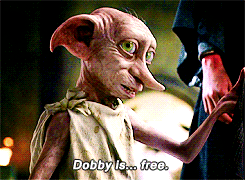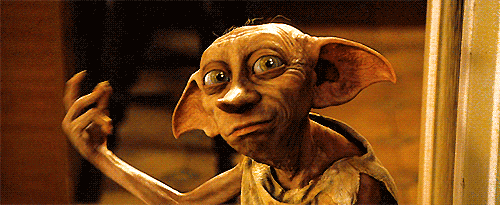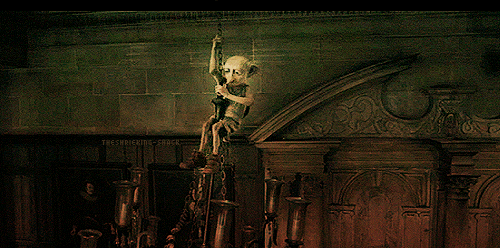Lost Lucius His Servant, Gained Dobby His Freedom
Come, Dobby. I said, come.”
But Dobby didn’t move. He was holding Harry’s disgusting, slimy sock, and looking at it as though it were a priceless treasure.
-p. 338, Harry Potter and the Chamber of Secrets

Source: http://25.media.tumblr.com/39884ce9fdba98be839e241a240d3c2a/tumblr_mh40z6aUa21rpm9hyo1_250.gif
On this day, May 30 in 1993, Dobby the house-elf was given a slimy, smelly sock of Harry Potter’s through Lucius Malfoy’s mistake, gaining freedom in the process. This was a monumental moment not only for Dobby himself but also for the developing politics throughout the Harry Potter series in regard to house-elf servitude/slavery.
Dobby in and of himself is acknowledged as an unusual house-elf in his cameos throughout the series. He desires freedom, unlike other house-elves, and asks for a paying wage. Though he still likes to work, he wants to do it on his own terms under a better boss than that of Lucius Malfoy, such as working for Headmaster Dumbledore in the Hogwarts kitchens.
Dobby likes work, but he wants to wear clothes and he wants to be paid, Harry Potter. . . . Dobby likes being free!”
[…]
“Dobby likes freedom, miss, but he isn’t wanting too much, miss, he likes work better.”
-p. 378-379, Harry Potter and the Goblet of Fire
In this instance Dobby resonates with a desire most of humanity embodies: It is not that we hate to work, but rather we hate the way that we must work. Working for someone who takes advantage of your employment and perhaps even abuses you or your work ethic makes for a horrible experience. Dobby, though beaten and abused and taught he is only a mere creature, knows that house-elves have more value than that of servitude and thus reaches for freedom as a way to a better life and a better job rather than to have all the free time in the world. He seeks a deeper purpose in his work than getting kicked around by the Malfoys.
This begins when he starts helping Harry Potter. Though he technically disobeys his masters, Dobby demonstrates that a deeper purpose—working for good and not siding with the side of the oppressor—ultimately benefits himself and the community with which he associates. Harry’s thoughtfulness and trickery in helping Dobby gain his freedom was to help Dobby self-actualize into a creature who is just as valuable as a witch or wizard.

Source: http://images4.fanpop.com/image/photos/21200000/Fan-Art-dobby-the-house-elf-21233094-500-205.gif
Dobby’s freedom also impacts the SPEW—or spew, according to Ron—storyline with Hermione. Dobby inadvertently sets himself up as an example of what Hermione fights for and believes in. Though her intentions may sometimes appear misguided, Hermione ultimately seeks to show house-elves their worth beyond their work. The most important part to remember is that their work may not define them, but they can define their work, as Dobby does in Goblet of Fire. Hermione’s Society for the Promotion of Elfish Welfare is modeled after what she sees in Dobby, and though Hermione misinterprets some of his ideals at times she works hard to spread the word of a house-elf’s value beyond being an unappreciated servant.
He expected the elf’s smile to vanish, his ears to droop; he expected him to say that this was impossible, or else that he would try, but his hopes were not high. . . . What he had not expected was for Dobby to give a little skip, his ears waggling happily, and clap his hands together.”
-p. 386, Harry Potter and the Order of the Phoenix

Source: http://images5.fanpop.com/image/photos/31600000/dobby-dobby-the-house-elf-31650728-500-248.gif
This is also significant in identifying the different ways in which Kreacher is treated throughout the series. When he is under Sirius’s rule, he is treated cruelly and neglected, though Sirius himself is not a cruel man. Regardless, just because Kreacher was a reminder to Sirius of the bitterness and horrible times of his childhood does not mean Kreacher deserved to be treated horribly in return. Kreacher remained loyal to Regulus and Sirius’s parents rather than Sirius himself.
And,” whispered Harry, his hands curled in cold fists on his knees, “Hermione kept telling us to be nice to him —”
“She was quite right, Harry,” said Dumbledore. “I warned Sirius […] that Kreacher must be treated with kindness and respect. […] Kreacher is what he has been made by wizards, Harry,” said Dumbledore. “Yes, he is to be pitied. His existence has been as miserable as your friend Dobby’s. He was forced to do Sirius’s bidding, because Sirius was the last of the family to which he was enslaved, but he felt no true loyalty to him. And whatever Kreacher’s faults, it must be admitted that Sirius did nothing to make Kreacher’s lot easier —”
-p. 832, Harry Potter and the Order of the Phoenix
Source: http://www.hp-lexicon.org/images/chapters/hbp/c19-elf-tails.jpg
However, the transformation of Kreacher is one that also shows his growing into a new purpose, much like Dobby has. When Harry begins treating Kreacher with kindness, his loyalty for Harry grows, and he begins to enjoy his work rather than resent his master. Harry does not ask Kreacher to wait on him hand and foot, but Kreacher does it willingly because he gets the recognition and respect he deserves.
He’s loyal to people who are kind to him, and Mrs. Black must have been, and Regulus certainly was.”
[…]
It took them nearly half an hour to calm down Kreacher, who was so overcome to be presented with a Black family heirloom for his very own that he was too weak in the knees to stand properly.
-p. 198, p. 200, Harry Potter and the Deathly Hallows
You’ve done really well, Kreacher,” said Harry, and the elf bowed low.
-p. 220, Harry Potter and the Deathly Hallows
The house-elves of Hogwarts swarmed into the entrance hall, screaming and waving carving knives and cleavers, and at their head, the locket of Regulus Black bouncing on his chest, was Kreacher, his bullfrog’s voice audible even above this din: “Fight! Fight! Fight for my Master, defender of house-elves. Fight the Dark Lord, in the name of brave Regulus! Fight!”
-p. 734, Harry Potter and the Deathly Hallows
The combination of Dobby and Kreacher’s storylines highlights the importance of treating people, especially different magical creatures, with kindness, respect, and love. Those who are trampled and oppressed by a certain society need to be given a true chance at being treated as equals so that they can go on to live the lives with the purpose they hold closest to their hearts and be productive for themselves as well as for their community. Kreacher’s transformation demonstrates just this, and Dobby’s shows a little more, that being Dobby’s own hero’s journey, just in the way we didn’t expect. Let us not forget Dobby’s most impactful moment of the entire series, where he embodies his purpose (p. 474, Harry Potter and the Deathly Hallows):

Source: http://data1.whicdn.com/images/65093291/large.gif
Rest in peace, Dobby, a free elf.

Source: http://pirun.ku.ac.th/~b521110223/images/dobby/Dobby’s_grave_and_Shell_Cottage_concept_artwork-1-%20-%20Copy.jpg

